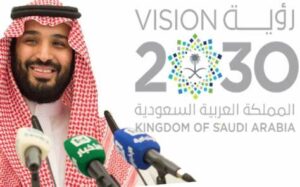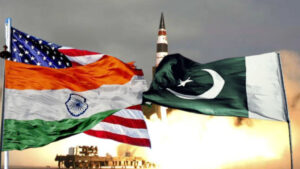The Saudi Vision 2030: The Rational Shift from its Multi-Dollar Oil Industry

By Rimsha Burki
Vision 2030, a bold plan to turn Saudi Arabia into a diversified and prosperous country by 2030, was introduced by Crown Prince Mohammed bin Salman in 2016. It seeks to create a dynamic society, a strong economy, and an ambitious country by escaping from reliance on oil. The three major goals of the vision are to establish the nation as the “heart of the Arab and Islamic worlds,” to dominate international investment, and to take advantage of the nation’s geographic location as a hub to connect Afro-Eurasia. The aims of diversification and increased competitiveness are outlined in Saudi Vision 2030. The structure relies on three primary themes that outline particular goals to be completed by 2030:
- Creating a dynamic society through UNESCO cultural sites, sports, urbanism, entertainment, urban life, and increasing life expectancy.
- A booming economy with non-oil exports, foreign direct investment, employment, women in the workforce, and global competitiveness.
- Progress towards non-oil income, government efficiency, e-Governance, household earnings and savings, nonprofits, and volunteer work.
Projects Under Vision 2030:
The projects include;
Neom Project: It aims at creating a futuristic and sustainable urban environment. This project includes the line, Oxagon, Sindalah and Trojena. Neom will constitute 10 different districts, but these four are announced so far.
Restoration of Historic Mosques: The Mohammed bin Salman Project for Developing Historic Mosques focuses on the restoration and preservation of the kingdom’s historic mosques, contributing to the cultural and heritage aspects of the vision.
Giga-Projects: These are large-scale development projects built across deserts, mountains, and waterfronts, with the aim of diversifying the economy and boosting the tourism sector. These projects are expected to open by 2030 and are receiving hundreds of billions of dollars in investment. Some other minor and major projects including focus on Women Rights, Education, Tourist visas, and Renewable energy projects are undergoing as per the plan.
Saudi Crown Prince Muhammad Bin Salman is supervising the whole project, and the decision-making lies within the council of ministers and Council of Economic and Development Affairs (CEDA). Muhammad Bin Salman spoke about his vision in different interviews till date and has a belief that “Middle East will be the new Europe.”
The Rationale Behind This Shift?
Analyzing the rationale behind this plan given by Muhammad bin Salman, the aspect of political economy is significant.
Due to trends of Green Politics, Saudi Arabia is trying to shift its revenue generation from oil to tourism (including pilgrims). For decades, oil has been the lifeblood of the Saudi economy, accounting for over 80% of government revenue and a significant portion of GDP. This dependence, however, has rendered the Kingdom susceptible to oil price fluctuations and global market shifts. The 2014 oil price crash exposed this vulnerability, prompting a search for alternative sources of income and economic growth.
This alternative will increase its revenue generation from tourism, up to 80%, like UAE. With the goal of attracting 100 million annual visitors and creating over 1.5 million jobs in the industry, this shift is significant, as it will decrease the country’s vulnerability to oil price fluctuations and global market shifts. By investing in tourism, cultural, and entertainment initiatives, as well as developing its natural and cultural heritage, Saudi Arabia is striving to offer a compelling and diverse range of experiences to global travelers. This transformation not only aims to secure alternative sources of income and economic growth but also to showcase the country’s unique attractions to the world.
Will It Be a Failure or Success?
This vision has a high risk of failure as per the analysis because firstly, Saudi Arabia lacks the modern technology required for this project. Most of these types of missions of Saudi Arabia, in order to lessen its dependency on oil, had failed in the past. So, this vision is both wonderful and incredibly unrealistic to be achieved, just like others. Additionally, some experts claim that Saudi government lacks self-discipline (or what investment gurus call emotional intelligence).
Secondly, even if it is successful, there is no guarantee that others will be attracted towards it. This program has several risks that make it very unsustainable. For example, if one component of The Line fails, the entire system may not function properly making it a major disadvantage. Additionally, MBS is receiving criticism from the Muslim community that in order to seek attention from western and European tourists, it is going against its own Islamic principles. Currently, Saudi Arabia has faced an immense back clash from Muslims all over the world for introducing alcohol bars in its project, even for non-Muslim diplomats. Analysts including Jane Kinninmont believe that “Vision 2030 is an attempt to show the world that there is a direction of travel away from oil, but nobody actually expects it to be fully implemented.”
Conclusion
Considering Saudi Arabia’s lack of technology innovation in this century, it is difficult to achieve such a challenging and unimaginable goal. Success ultimately relies on the willingness of foreign investors to invest in the nation. But current political risk concerns have hindered the country’s ability to attract the necessary levels of investment. Now the time will show whether MBS’s vision 2030 will be a success or a failure. However, it is clear that the vision is a significant undertaking that will have a major impact on Saudi Arabia.
The views expressed in this article are solely those of the author and do not necessarily reflect the views of The Global Politico.

Rimsha Burki

The Duality of U.S. Policy in South Asia
The recent U.S. sanctions on Pakistan’s missile program, coupled with unsubstantiated claims of its targeting the U.S., reflect a broader geopolitical strategy aimed at undermining Pakistan’s strategic autonomy while selectively favoring India’s missile advancements, thereby exacerbating regional power imbalances in South Asia.

The BRICS Challenge: Can 100% Tariffs Save the U.S. Dollar?
Trump’s 100% tariff threat on BRICS may backfire, accelerating de-dollarization, sparking trade wars, and undermining U.S. economic dominance globally.

Threat Towards Nuclear Safety and Security Amid Global Tensions
Global nuclear safety is increasingly at risk amid rising international tensions. While India and Pakistan exhibit restraint with nuclear infrastructure agreements, superpowers like the U.S. and Russia escalate conflicts by targeting strategic facilities. This disparity emphasizes the need for global nuclear safeguards to prevent potential catastrophes from intentional or accidental nuclear incidents.

The SCO Summit in Pakistan: Opportunity or Challenge?
The upcoming SCO Summit presents Pakistan with a crucial opportunity to enhance its global standing, but also significant challenges. Missteps in handling political instability or countering India’s narrative could backfire. To seize this moment, Pakistan must skillfully manage relations with key players like China, Iran, and Russia while diplomatically addressing India’s criticisms. A well-crafted, strategic approach is essential to turning these challenges into long-term foreign policy gains for the country.

Indian Occupied Jammu and Kashmir Elections 2024: A Mere Façade?
The article argues that 2024 elections in Indian Illegally Occupied Jammu and Kashmir are seen as a façade, aimed at diverting the region’s freedom movement amid ongoing human rights violations and central government control following the abrogation of Articles 370 and 35A.

Industry, Innovation and Infrastructure: Building A Foundationally Sound Pakistan
This article investigates Pakistan’s position within Sustainable Development Goal (SDG) 9, “Industry, innovation and infrastructure.” It explores Pakistan’s in developing a robust industrial base, fostering innovation and establishing a sustainable infrastructure network. Through key government initiatives like “Digital Pakistan” and the National Transport Policy, Pakistan’s role maintaining its commitment to SDG 9 is highlighted. Additionally, it explores the potential challenges in addition to their possible solutions that Pakistan face in its journey to Goal 9.

